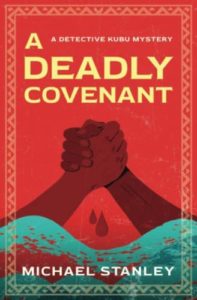 The eighth book in Michael Stanley’s enjoyable Detective Kubu series, set in Botswana, tells his origin story as a detective. As readers, we have already come to love Kubu and his wife, Joy, so it’s a pure delight to read this book, which chronicles their early courtship and Kubu’s beginnings as a detective. Kubu’s shyness and uncertainty with Joy only add to the human dimensions of his personality, a personality already well fleshed out in previous novels.
The eighth book in Michael Stanley’s enjoyable Detective Kubu series, set in Botswana, tells his origin story as a detective. As readers, we have already come to love Kubu and his wife, Joy, so it’s a pure delight to read this book, which chronicles their early courtship and Kubu’s beginnings as a detective. Kubu’s shyness and uncertainty with Joy only add to the human dimensions of his personality, a personality already well fleshed out in previous novels.
He’s not quite as uncertain on the job, though he’s junior enough to be uncertain that his superiors will listen to his ideas on a case. His boss, Mabaku, sends his into the wilds of Botswana to observe pathologist Ian MacGregor (a Scot new to the country) as news that a cache of bones have been unearthed on a construction site. MacGregor will be processing the bones and Kubu is told to watch and learn.
However, as digging continues, more and more bones are unearthed, pointing to a massacre of a large number of Bushmen in the fairly recent past. The dig draws attention both from a distraught father, looking for the long lost body of his son and who hopes the bones might belong to him, as well as a Bushman named Selelo who appears and who seems to want to communicate with the dead in some way.
When a man turns up dead after a meeting of the town council, Kubu is along on the following investigation, and he’s sure it’s is heading in the wrong direction. He and Ian have each other for back-up, but they are out of towners operating in another officer’s jurisdiction and station. As more bodies and skeletons appear, Kubu is certain of one thing: the Bushman, Selelo, is innocent. Unfortunately the local Assistant Superintendent, Balopi, is equally sure that the Bushman is a killer, and takes him into custody.
Kubu goes along with Balopi’s charge of the Bushman, but when Selelo escapes and someone else is killed while he’s out of the picture, Balopi’s certainty still remains solid. All along, Kubu has been communicating with his superior back home in Gabarone, and finally, Mabaku decides to come to town and sort things out for himself. All of the cases – the bushmen’s skeletons, the long missing man, and the two more recent murders seem to be related. The puzzle is figuring out how.
One of the joys of these books is the discovery of African culture, including a pace of life and expectations that are very different from our own Western ones. In one of the lovelier sequences of the novel, Selelo, who needs to communicate with the dead just uncovered, performs a ritual dance which takes him out of his body and allows him to speak to them. The instructions the ancestors give him seem both ambiguous and problematic, but Selelo is as sure of his communication as Belopi is sure of his conviction of Selelo’s guilt.
These are also traditional novels of deductive reasoning, and Kubu’s brain is one of the sharpest on his team. Mabaku, as Kubu’s mentor, slowly guides and encourages him to speak out and to think things through. The confidence he gains working with Mabaku helps him to solve the case. It’s certainly a team effort, but Kubu has the essential insight. The denouement is extremely golden age in its ultimate resolution. The many threads that are successfully woven into one cloth by the talented Michael Stanley make for a very rich reading experience. This is one of the strongest novels in the series.